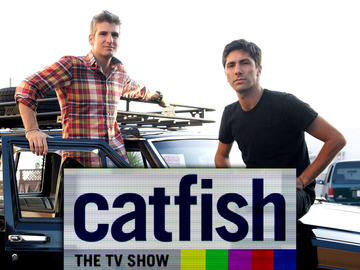In 2010 Neve Shulman began an online relationship with a woman on Facebook. Him, a talented, successful photographer running a production company with his filmmaker brother, Ariel; Her – Meagan – a talented singer with model good looks and a personality to match.
Their relationship began when Meagan’s eight year old sister sent Nev a painting of one of his photographs and, touched by the young girls talent, he contacted the family to say thank you.
Over a period of many months Nev became close with the family, but he became particularly close with Meagan, and many hours were spent texting, phoning, Facebook-ing and, endearingly, sending letters. Slowly, they were falling in love.
There was just one problem: Nev lived in NY; Meagan and her family lived in Michigan. So, one day, after many months of falling for someone he had never met Nev decided that he wanted to meet Meagan in person. He was going to drive to Michigan and finally be with her, and his filmmaker brother was going to document the whole journey.
So Nev drove and Ariel (and co-director Henry Joost) filmed. Everything. What happened when they finally got to Michigan will not be revealed by this writer0 (for the sake of spoilers), but the documentary that became of the footage now represents something of modern-pop cultural record for the internet generation.
When it premiered at the Sundance Film Festival in 2010 the film about this journey, titled rather oddly as Catfish was the talk of the film community. Many questioned in authenticity and the trailer would have you believe that it was a found-footage horror film, but regardless of this the film struck a nerve with a large audience when it was released by Paramount and Rouge Pictures in
late 2010. Critics the world over have praised the film and it currently stands with and 83% of RottenTomatoes. Not bad for a film that was shot on a whim.
Catfish has since become a term recognised the world over. A cultural phenomenon that extends much beyond its definition on UrbanDictionary, and now, courtesy of Nev and his filmmaking partner Max Joseph, it exists on TV as well.
I sat down with Nev and Max at the Millennium Hotel in London to discuss the Catfish experience and what we can expect from the TV show (already commissioned for a second season in the States) on the eve of its UK air date on MTV.
Congratulations on the success of the show. At what point of the ‘Catfish’ film experience was the decision made to take it to TV?
Nev – Unlike most films – and unlike most TV series’ – we didn’t really have to come up with anything. The story had already happened organically. In my case, I had an online relationship with this woman and this family who it turned out were not who they said they were. And it turned out to be this crazy story of deception that would ultimately become ‘Catfish’ the film.
When that came out in 2010 all the people who watched it were talking about the film and it sparked this huge conversation and outreach from people to me. Looking to me for help or advice regarding their crazy internet romance story.
So it just seemed obvious that if there are this many people having these kinds of relationships and looking for answers, maybe I can provide them and help these people be a show. Would it be people you know who would ask you for advice or complete strangers.
Max – It was mostly complete stangers. People from all across the country who had gone to see the film. The film is all about social media and people making connections through social networks and so the first thing they did, I guess, when the film was over was go online and try to contact us.
It’s strange because they would have these similar experiences and they wouldn’t tell their friends; they wouldn’t tell their family, but Neve’s voice validated that experience for them and empowered them to come forth with their own stories.
So ‘Catfish’ is a universal experience that has happened to the 100 million facebook users?
Nev – Exactly. I think that’s why we go to the movies; to see a version of ourselves on the screen and I think that Catfish the film and the TV show capture that effectively. There’s no ‘added drama’ or embellished storyline, it’s just real people; real lives; real stories. And when you give people space to express themselves in a safe, non-judgemental environment, they’ll express the universal
feelings that we all experience. That’s why I think people enjoy watching the show because, much like the movie, everybody has an opinion and our goal is to give people the confidence to have those opinions and those feelings and to discuss them.
Was it important for you, when beginning this TV show, to have support in keeping the stories honest and not have them embellished by the production in any way?
Nev – One of the reasons we wanted to work with MTV in producing the show was that we really felt that they represent and understand the voice of the online generation; people who live and breathe the internet and have done for as long as they can remember. In addition to that they were willing to give us complete contol; Carte Blanche to make the show that we, as documentary filmmakers, wanted it to go.
Are you still questioned about the authenticity of the ‘Catfish’ projects, both film and TV?
Max – There was a lot of controversy surrounding the film when it was released about whether it was fictitious – which , for the record, is completely ridiculous – It’s all real. But that controversy helped the get the film a lot of attention and
started all of the discussions.
So when we approached the show we made it clear we wanted to make the show in a very transparent way. We want to see the crew; we want to see the sound guy; we want to break the ‘fourth-wall’ and we want to see the filmmaker in the show. The audience are seeing exactly what we are seeing. Neve and I requested that we know nothing about the storylines until the day we start shooting and
meet the hopeful. We wanted our experience to echo that of the audience and that means going in with little to no information. Our experience is the audiences experience.
Are you still receiving emails?
Nev – Yeah, we both get emails. Friends contact me all the time saying that someone they know saw that I liked a picture on Facebook or Instagram and now they’re desperate to talk to you about their experience. There is a real need to connect with me about this. I seem to be the only person to turn to for people who are having mixed feelings about something that happened to them online
– whether they were the victim or the ‘catfish’- just looking for some kind of an answer.
Max – A lot of people who spend a significant amount of time online are used to living in a kind of vacuum. There online activity is generally very private – people in general are very private. We don’t like anyone seeing our online history or what sites we go to, and when we start getting into relationships we wait until they become ‘official’, when they start to manifest themselves in the ‘real world’, we don’t like telling anyone about them, for whatever reason.
So in this world where no one knows what they’re doing, all of a sudden they’re having a crisis and they need ‘help’, Nev seems to be the one person that they can reach out to online because he is safe to them. A kind of lighthouse.
Your experience of being ‘Catfished’ was obviously very personal in the film as you were the subject yourself. How different was it being an observer in someone elses story?
A feeling that I had at the end of my experience – other than dissapointment – was relief. Because I had gotten some closure and was able to move on from it. So I get a lot of satisfaction on the show from giving people that same opportunity. Whether or not they fall in love afterwards… of course I’m hopeful, but more than anything I’m happy that I can facilitate some closure.
Something that we see in every episode is a huge amount of relief on the part of the ‘catfish’. Who, for months of years, has been holding this lie up on their shoulders; crafting this character who has kept them from their real life. So for them to be able to end it in a meaningful and positive way with the person they have been talking to, that’s a huge relief for them. It’s nice to be able to see that.
Max – A lot of the email that we both get are from people who have had ‘catfish’ experiences. These cold-case mysteries that have no conclusion and leave the people wondering…So to bring resolution to some of these stories is a major desire, both for us and for them.
And something that works about ‘Catfish’ in the TV format is that you get lots of opportunities to do this.
Nev – Yeah. Each episode will follow a similar structure, in that, we have two people communicating – who’ve never met – and we bring them together in the hope of finding love and we see what happens. But, simply by the nature of that, we’re dealing with people who live in different places; have different socio- economic backgrounds; different sexual orientations – the outcomes are almost limitless.
We find stories that all start the same and have an almost unpredictable outcome. Every time we finish an episode we look at each other and say, “I can’t believe that just happened. There’s no way the next one could be any crazier.” Then sure enough, we find ourselves saying it again at the end of the next episode.
Is a ‘happy ending’ something you hope for with every ‘hopeful’?
Max – People ask us a lot, “Are there going to be any episodes with a happy ending?” It seems strange to me because, when you’re in the show, I would say a large majority of the stories end happily. Not necessarily with the people getting together but with one – if not both parties –being able to get closure. That’s still a ‘hopeful’ ending, I think.
Nev – What I think makes this show unique and fun to watch is that it explores what is a very real phenomenon that is; people are not only looking for love online, but also pretending to be people they are not. And that’s what’s interesting. That’s what people are afraid of and excited by. So as much as I hope that these people fall in love, the truth is the show is about the human condition. Our insecurities; our fears and our desires.
Catfish Begins on 21 January on MTV.




